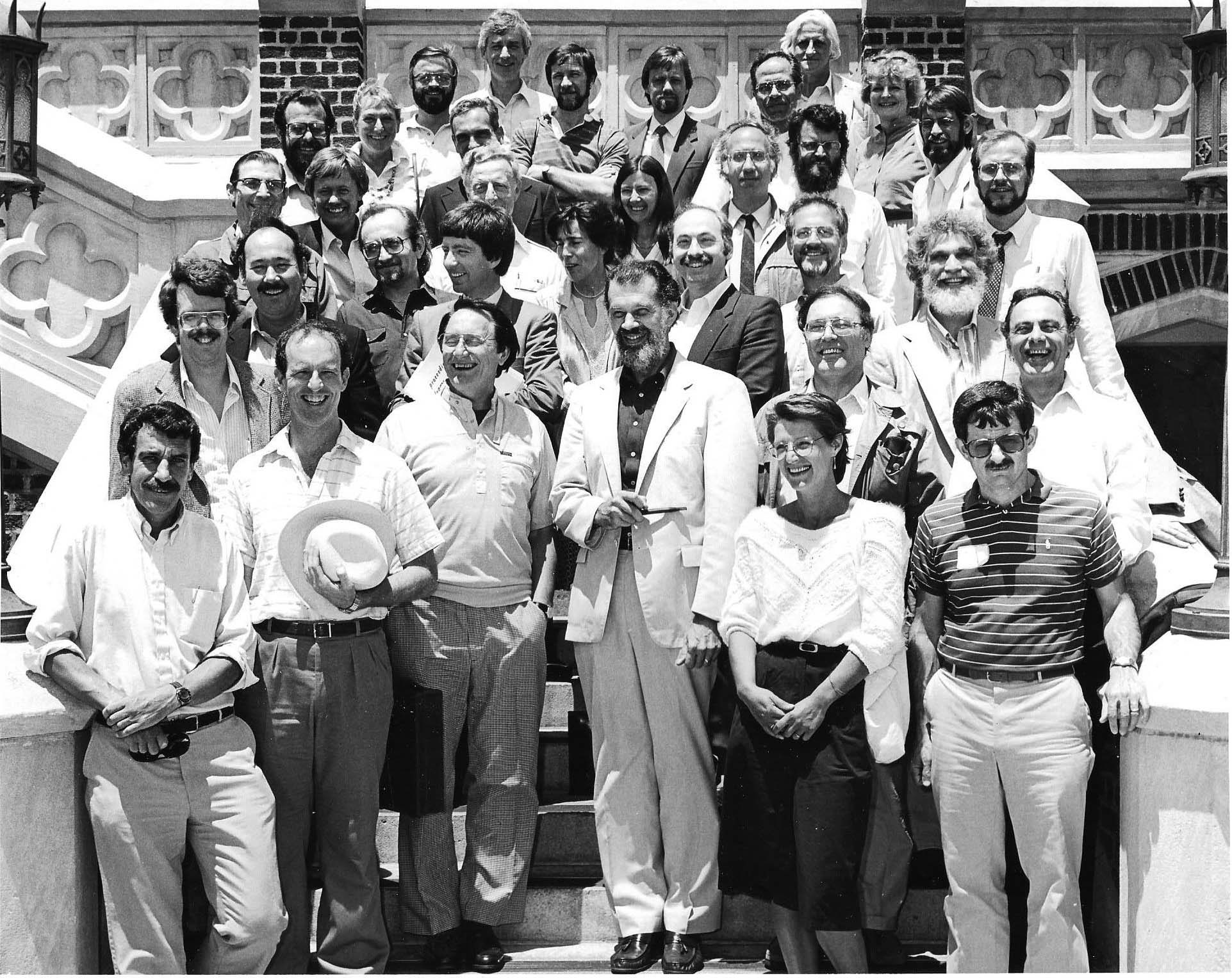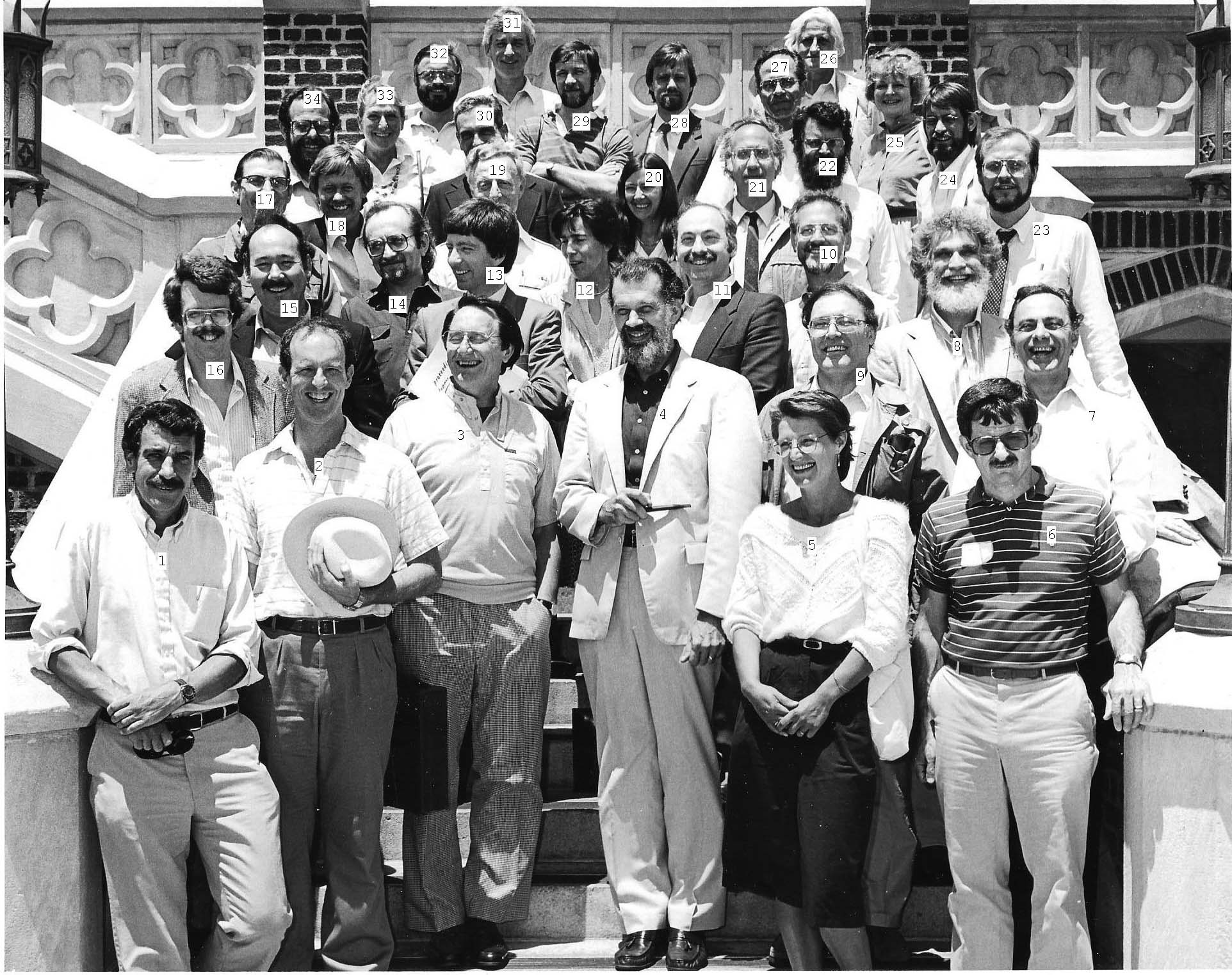History
The first conference in North America on Heidegger’s philosophy, which took its point of departure from a message sent by Heidegger himself,1 was held at Drew University, Madison, NJ, in April 1964.2 Through the initiative of Manfred Frings in 1965, then at Duquesne University, and in 1966 at DePaul University, two conferences on Heidegger ensued at these universities in the fall of 1966.3 Their proceedings were published, each with messages from Martin Heidegger,4 by Duquesne University Press and by Quadrangle Books, Chicago, respectively. Participants at the Heidegger conference at DePaul University in 1966 agreed that meetings should be held annually for the purposes of sharing current research interests on and discussion of Heidegger’s works.
The first annual meeting of the Heidegger Circle—its organizational meeting—took place at Penn State in May of 1967. In attendance were:
- John M.Anderson (1914-1999)
- John Bailiff
- Bernard J. Boelen (1916-1995)
- Manfred S. Frings (d. 2008)
- Theodore J. Kisiel (1930-2021)
- Joseph J. Kockelmans (1923-2008)
- Thomas Langan
- Linda Leonard
- William J. Richardson (1920-2016)
- Calvin O. Schrag
- Bernard Toussaint
- Cyril Welch6
Annual meetings of the Heidegger Circle have been hosted by the following universities:
- 1967 The Pennsylvania State University
- 1968 University of Pittsburgh
- 1969 DePaul University
- 1970 Trinity College (Connecticut)
- 1971 University of Toronto
- 1972 DePaul University
- 1973 Hunter College
- 1974 Duquesne University
- 1975 Wilfried Laurier University
- 1976 DePaul University
- 1977 Tulane University
- 1978 Villanova University
- 1979 Duquesne University
- 1980 University of Toronto
- 1981 The Pennsylvania State University
- 1982 Loyola University of Chicago
- 1983 University of New Hampshire
- 1984 University of Wisconsin-Stevens Point
- 1985 Loyola University of New Orleans (see group photo below)
- 1986 DePaul University
- 1987 George Mason University
- 1988 University of Wisconsin-La Crosse
- 1989 University of Notre Dame
(Proceedings 1990-present are available in digital form to current members)
- 1990 Seattle University
- 1991 Vanderbilt University
- 1992 Loyola University of New Orleans
- 1993 SUNY at Stony Brook
- 1994 Brigham Young University
- 1995 Skidmore College
- 1996 University of New Hampshire
- 1997 The Pennsylvania State University
- 1998 Villanova University
- 1999 DePaul University
- 2000 Marshall University
- 2001 Fordham University
- 2002 Southern Connecticut State University
- 2003 Old Dominion University
- 2004 University of New Orleans and Louisiana State University (Conference program)
- 2005 Goucher College (Photos and conference program)
- 2006 Boston University (Photos and conference program)
- 2007 DePaul University (Photos and conference program)
- 2008 Northern Illinois University (Photos and conference program)
- 2009 Xavier University (Photos and conference program)
- 2010 Stony Brook University (Conference program)
- 2011 Marquette University (Photos and conference program)
- 2012 Emory University (Conference program)
- 2013 Southern Connecticut State University (Conference program)
- 2014 University of South Florida and Florida Gulf Coast University (Conference program)
- 2015 Loyola University Maryland (Conference program and photos)
- 2016 DePaul University (Conference program)
- 2017 Whitman College (Conference program)
- 2018 Goucher College (Conference program)
- 2019 Nazareth College of Rochester(Conference program)
- 2020 Gonzaga University (Canceled due to Covid)
- 2021 Gonzaga University(Conference program)
- 2022 The University of Memphis(Conference program)
- 2023 Boston University(Conference program)
- 2024 Trinity College(Conference program)
Each year, a faculty member at the hosting university functions as convener. Attendance at the conference is open to all Heidegger Circle members. All interested scholars are welcome to submit papers, which are blind-reviewed. Papers are collected in proceedings and are delivered consecutively at the conference.
The Circle was granted tax-exempt nonprofit status in 2009.
The secretary-treasurer (John Rose, johnrose2@gmail.com) maintains a mailing list. The Heidegger Circle archive is housed at the Simon Silverman Phenomenology Center at Duquesne University.
This photograph of attendees at the 1985 Heidegger Circle meeting at at Loyola University of New Orleans was taken by the convener, James Watson, and provided in digital form by Reginald Lilly.


Attendees (see numbered photo below):
1. Thomas Sheehan, 2. Michael Zimmerman, 3. Manfred Frings, 4. James Watson (convenor), 5. Jeffner Allen, 6. John Caputo, 7. Eugene Gendlin, 8. Robert Scharff, 9. Gian-Carlo Rota, 10. John Bailiff, 11. Hugh Silverman, 12. Annemarie Gethmann-Siefert, 13. Carl Friedrich Gethmann, 14. Hans Seifried, 15. John Sallis, 16. Richard Taft, 17. Richard Palmer, 18. Wilhelm Wurzer, 19. William J. Richardson, 20. ?, 21. David Michael Kleinberg-Levin, 22. Kenneth Maly, 23. Reginald Lilly, 24. ?, 25. ?, 26.?, 27. Parvis Emad, 28. John McCumber, 29. Drew Hyland, 30. George Kovacs, 31. Walter Brogan, 32. Charles Seibert, 33. Joan Stambaugh, 34. Charles Scott
Notes
- “Einige Hinweise auf Hauptgesichtspunkte für das theologische Gespräch über ‘Das Problem eines nichobjektivierenden Denkens und Sprechens in der heutigen Theologie’.” This ten-page “letter” to the Drew Conference dated March 11, 1964, was first published in 1970 in pamphlet form along with Heidegger’s 1927-28 talk, “Phänomenologie und Theologie,” and reprinted in GA9: 68-72. English translation in Martin Heidegger, Pathmarks (Cambridge UP, 1998), pp. 54-62.
- A first-hand account (available on line) of this three-day Second Drew University Consultation on Hermeneutics under the title, “The Problem of Non-objectifying Thinking and Speaking in Contemporary Theology,” is given by Robert W. Funk in “Colloquium on Hermeneutics,” Theology Today 21, 3 (October 1964): 287-306. The notorious highpoint of the conference, as reported in The New York Times (April 11, 1964), was the passionate keynote address by Hans Jonas, former student of both Rudolf Bultmann and Heidegger, who questioned the relevance of especially the later Heidegger’s thought to the theological enterprise and warned the body of theologians in attendance, both continental and American, of the “profoundly pagan character of Heidegger’s thought.” Responding to Jonas’ paper at Drew was Bill Richardson, who rose to the defense of Heidegger there and, shortly thereafter in a more definitive form, in his Suarez lecture at Fordham University. Cf. William J. Richardson, S.J., “Heidegger and God—and Professor Jonas,” Thought 40 (1965): 18-40.
- Manfred Frings first proposed the idea of holding a Heidegger symposium during the academic year of 1965-66 while he was a member of the Department of Philosophy at Duquesne University. The Department underwent a radical split that year—phenomenologists versus traditionalists—and Manfred moved on to DePaul University, where he organized the Heidegger Symposium that took place on campus on November 11-12, 1966. Duquesne held its symposium on its campus on October 15-16, 1966.
- Heidegger’s letter of September 20, 1966 (three days before the Spiegel-Gespräch!), addressed to Arthur Schrynemakers, chair of the Heidegger symposium held at Duquesne, is published in bilingual form in John Sallis (ed.), Heidegger and the Path of Thinking (Pittsburgh, Duquesne UP, 1970), pp. 9-11, which also includes “several of the papers” (p. 8) presented at the Duquesne symposium. Heidegger’s letter to Manfred Frings of October 20, 1966, is published in bilingual form in Manfred S. Frings (ed.), Heidegger and the Quest for Truth (Chicago: Quadrangle Books, 1968), pp. 17-21, with a commentary by Bill Richardson, pp. 21-27. This volume is in fact the Proceedings of the DePaul Symposium and its seven papers presented by John Anderson, Paul Ricoeur, Bernard Boelen, Calvin Schrag, Alphonso Lingis, Albert Borgmann, and Joseph Kockelmans.
- Joe Kockelmans died in State College, PA on September 28, 2008 at the age of 84. As the Convener of the first two annual meetings of the Heidegger Circle, at Penn State 1967 and at Pitt 1968, he must be regarded not merely as a founding member but also as a founding organizer of the Circle. He then organized the International Colloquium on Heidegger’s Conception of Language held at Penn State in September 1969, the Proceedings of which are published in Joseph J. Kockelmans (ed.), On Heidegger and Language (Evanston: Northwestern UP, 1972).
- Two of the original “charter” members, Liliane Welch (since 2005) and F. Joseph Smith (since 2002), have been left off the list in recent years.
- The extant archival paper trail of these earliest meetings of the Heidegger Circle is quite thin, but fortunately a record has been made of their respective programs in Hans-Martin Sass (ed.), Martin Heidegger: Bibliography and Glossary (Bowling Green: Philosophy Documentation Center, 1982), pp.408-13. On average, four papers were presented at each of these early meetings.
- The pre-circulated “programme” for this meeting in Waterloo, Ontario (Canada) bears the title “10th Annual Heidegger Circle Meeting.” This annual meeting, whose Secretary-Convenor was José Huertas-Jourda, likewise inaugurates the custom of pre-circulated bound proceedings. Plans to publish this Proceedings came to naught, but the publication would have included a letter of May 6, 1975, from Heidegger to Walter Biemel, one of the speakers at the meeting, conveying his greetings and gratitude to the participants: “Das Programm ist weit gespannt und wird viel Anregung bringen. Ich bitte alle Mitwirkenden am Kolloquium, die mir persönlich bekannten und die unbekannten, von mir herzlich zu grüssen und für ihr Interesse an der Sache der Phänomenologie zu danken.”
- The program brochure—the first in a long line of brochures—announces the “10th Heidegger Conference,” which 1) initiates the change in name of the group from “Heidegger Circle” and 2) initiates the enumeration of annual meetings from the 1967 Penn State organizational meeting, making the 1966 DePaul Symposium our inaugural Ur-meeting, meeting number zero. The program brochure likewise includes for the first time the above brief story of origins with charter membership and list of previous annual meetings, composed by Manfred Frings, the Secretary-Convenor of the 10th Heidegger Conference at DePaul. It might be noted, and suggested as a mnemonic device, that our enumeration historically parallels the enumeration of the NFL Super Bowls, where the two conference winners of the 1966 season met in Super Bowl I in early 1967 (Packers over the Chiefs).
- In a letter dated April 11, 1976, bearing the title “Neuzeitliche Naturwissenschaft und moderne Technik,” Heidegger sends his “greetings to the participants of the tenth colloquium on May 14-16, 1976, in Chicago.” “Thinking persons exchange greetings by posing questions to one another,” and the particular version of the being-question that Heidegger proposes to the Chicago colloquium is the question of the relationship of science and technology in the age of modernity, a global manifestation that he for a time associated with “Americanism” and American “giganticism.” The letter is published in bilingual form in Research in Phenomenology VII (1977): 1-4. The question of the being of modern science and modern technology is therefore made central in the 11th annual Heidegger Conference convened by Michael Zimmerman at Tulane, in the first of the theme-driven Heidegger Conferences, and once again in the 35th annual Heidegger Conference convened by Babette Babich at Fordham in the millennial year of 2001.
- This Silver Anniversary Conference was singularly devoted to the recently published Beiträge zur Philosophie: Vom Ereignis, reputed to be Heidegger’s second opus magnum.
- The theme and focus of this 36th annual Heidegger Conference was “Heidegger and France.”
- The membership present decided to revert from the name North American Heidegger Conference to its original name of “Heidegger Circle” and to reorganize the Circle under the direction of a five-member executive committee composed of a presiding officer (3 year term), a secretary-treasurer (6 year term), and the past, present, and future conveners of the annual meetings.
